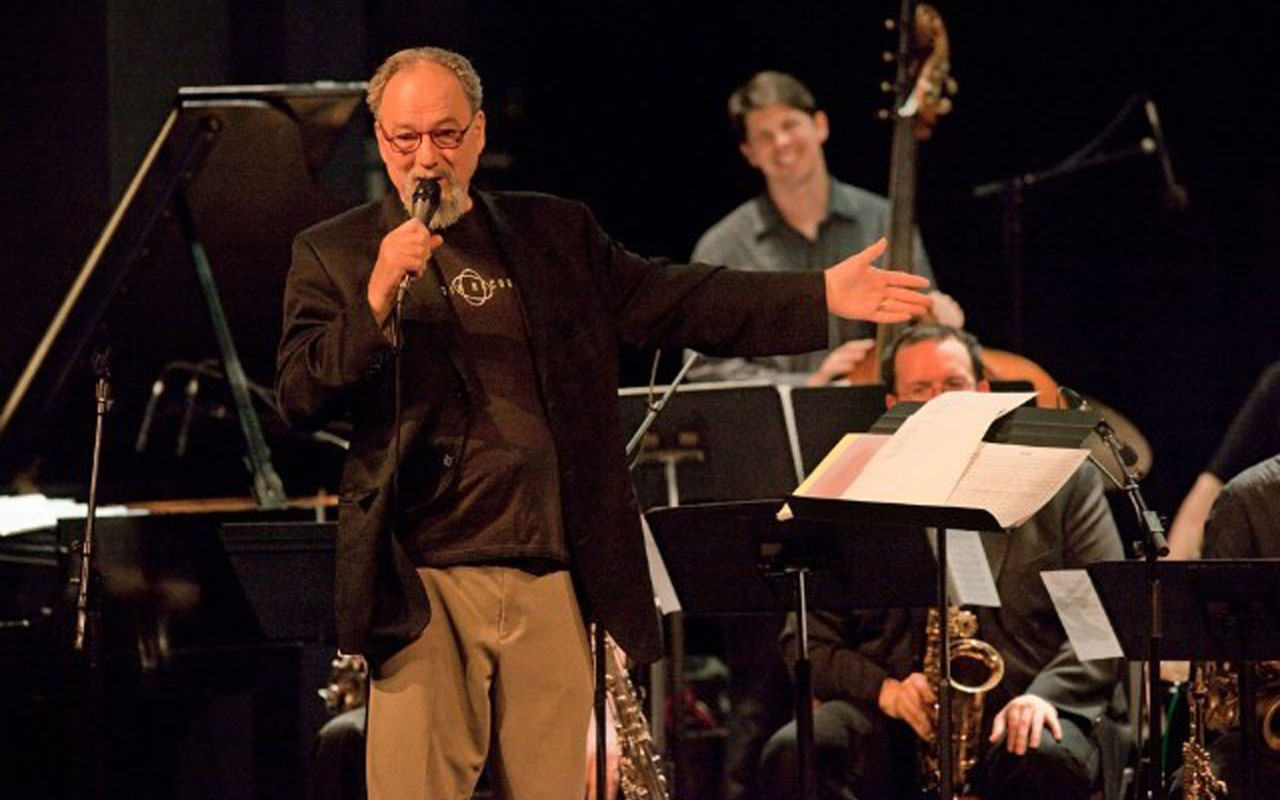
Jim Knapp photo by Michael Craft.
Throughout the year, Earshot Jazz is proud to be sharing brief excerpts from the forthcoming book, After Jackson Street: Seattle Jazz in the Modern Era, by Seattle’s preeminent jazz writer, Paul de Barros. Picking up where de Barros’ Jackson Street After Hours (Sasquatch Books, 1993) left off, the new book will be published by the History Press of Charleston, S.C., and will feature fascinating interviews with the familiar artists and under-sung heroes who shape the vibrant jazz scene of the Pacific Northwest.
In August, 1979, when I was thinking about moving to Seattle, I happened upon a concert at the Moore Theatre by the Composers and Improvisors Orchestra (CIO) featuring guest artists Sam Rivers and Dave Holland. “Wow,” I thought, “if that’s the kind of music they play here, Seattle must be OK!” Forty-two years later, I am still eternally grateful to trumpeter, composer and CIO founder Jim Knapp, for helping me make the decision to live here.
Knapp started the CIO in 1977, six years after he replaced exiting faculty member Floyd Standifer at Cornish College of the Arts. Featuring top Seattle players such as reed man Denney Goodhew and bassist Chuck Deardorf, among others, the CIO not only showcased artists such as Rivers, Holland, Gil Evans, Bob Brookmeyer, Ralph Towner and many others, but served as the house organ, if you will, for the luxuriously lyrical compositions of Knapp himself. Over the years, Knapp, who came to Seattle from his hometown of Chicago, in 1969, has not only given us great music—on stage and on discs such as First Avenue (ECM) and Secular Breathing (Origin)—he also assembled and led an illustrious jazz faculty at Cornish in the 1970s and ‘80s that included bassist Gary Peacock, trombonist Julian Priester, pianist Art Lande, drummer Jerry Granelli and vocalist Jay Clayton, not to mention Seattle stalwarts such as Goodhew, Deardorf, Dave Peck, Dave Peterson, and Joni Metcalf. Just as my discovery of Knapp came about as a happy accident, so, too, have some of the developments in Knapp’s career also come by surprise, as you will see from the excerpts below, taken from three interviews conducted in 2020, and 2021. –Paul de Barros
When I first moved to Seattle I was looking for work, naturally, and one of my jobs was as a Fuller Brush Man, going door to door. One day, I was on Queen Anne Hill and a very nice, elderly lady and I got to talking and she said, “Oh, my son’s a musician.” “Oh, really?” “Yes,” she said, “his name is Gary Peacock.” For me, there were three bass players who were changing the way it goes—Charlie Mingus, Scott LaFaro and the third was Gary Peacock—so naturally I hung out a little longer. She said he was just back from Japan where he’d been studying oriental medicine. Well that’s nice, I thought, and I went on with my route. A while later I was at a bookstore and a guy walked in and I just knew it was Gary Peacock. We had coffee and talked about music. So after I got the gig at Cornish to start a jazz program, they needed a theory teacher, so I suggested Gary. Of course all the students wanted to study bass with Gary and eventually he taught that, too. He was very influential on the Cornish scene and helped establish Cornish as an internationally known mecca for jazz music. I think a lot of the (other) teachers came there because of him.
About that time, I had also gotten to know Dave Holland quite a bit—he came through town a lot—and I remember he insisted, “Whatever you do, include free music in the curriculum. It’s too easy to just let it go by.” And I did it, and I think that’s one thing that set the Cornish program apart from others. It wasn’t just about teaching “the rules of jazz.” There was always a free ensemble.
(In the early ‘70s) there was a band in Seattle led by a drummer named Joe Field called Matrix. I played trumpet. It was an interesting band that had both classical and jazz players. Ron Simon played bass guitar—he was principal bassist in the Seattle Symphony—and there was violin and viola, all electric, amplified. It was a pretty good band. It was kind of like what I thought baroque orchestras must have been like, in Bach and Handel’s time, which I thought was an interesting time in music. It dissolved when Joe moved out of town, but the Composers and Improvisors Orchestra was kind of my version of that band. The CIO was more jazz—it had acoustic bass, whereas that band was more of a rock band—but I liked the instrumentation. And it was Joe’s idea.
The story about how First Avenue (a free-improvising trio with Goodhew and cellist Eric Jensen) came together is interesting. Eric was on the faculty at Cornish and he wanted to do this Stockhausen piece that had this elaborate setup of equipment and precise timings of this and that, so we were sitting in his living room trying to figure this stuff out and I said, “Why don’t we just improvise? It’ll sound just as good!” So we did, and we had such a great time playing together, cello and trumpet—and Denney was just a natural addition—that that became the trio.
— Paul de Barros